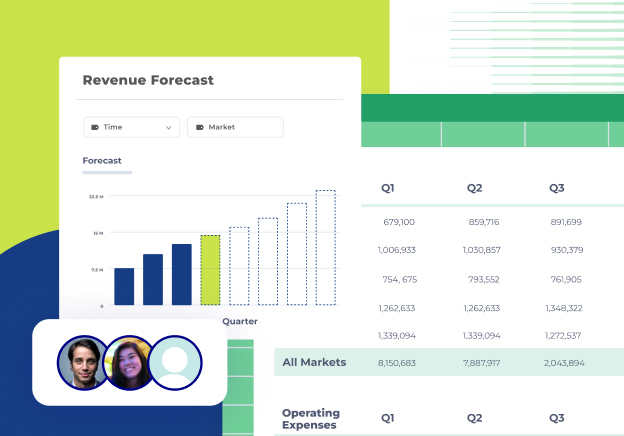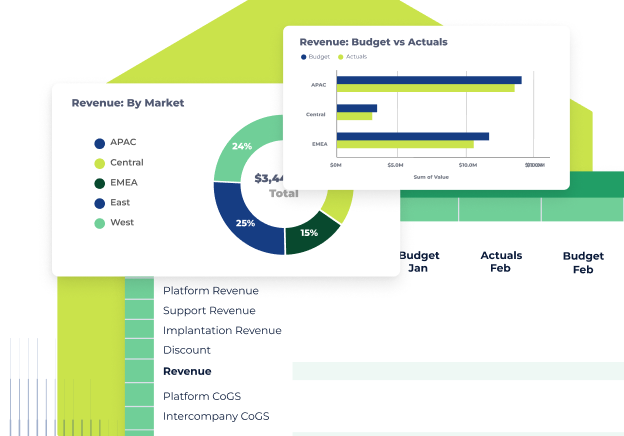Hi ,
Strategic finance is the goal. It's what turns the finance function into a driver of smarter decisions, faster planning, and better alignment across the business.
But getting there takes more than a quick fix or a new software solution. To build a finance function that runs smoothly and scales with the business, you need alignment across people, process, and technology. When those elements are working together, teams can focus less on firefighting and more on planning, analysis, and strategic support.
In this edition, we're breaking down what that alignment looks like and how it drives true finance transformation, setting the stage for teams to lead with clarity and confidence.
Happy planning,
The Cube Team |
♻️ Read our 3-pronged approach to strategic finance transformation.
📖 Check out 7 trends impacting FP&A in 2025.
💬 Share your most valuable strategic finance skill in our community Q&A. |
What is finance transformation really?
|
Finance transformation isn't just about new systems or processes, it's about unlocking the full potential of your finance team.
It means aligning people, processes, and technology so finance can move faster, work smarter, and drive the business forward.
When finance is freed from manual work and scattered data, it shifts from reporting the past to shaping the future. That's what makes strategic finance possible.
|
What does this look like? |
It looks like real-time insights, smarter collaboration, and confidence in your guidance, all powered by connected technology and a strategic mindset.
👥 People
Finance transformation starts with people who are aligned on how work gets done. That means clear roles, defined ownership, and strong communication across teams. Without that foundation, finance teams spend more time fixing handoffs and clarifying responsibilities than driving strategy.
Take data management as an example. One way to start building this alignment is by assigning data owners. Designating specific people to be responsible for data integrity, governance, or consolidation creates accountability, reduces confusion, and helps the team trust the numbers they're working with.
⚙️ Process
Processes are the engine of a scalable finance function. They shape how data flows, how reports are built, and how insights are delivered. Without consistent, well-defined workflows, teams end up reacting to problems instead of planning ahead.
One way to strengthen your processes is to document a high-impact workflow, like budget vs. actuals. Clarifying each step and assigning responsibility helps reduce confusion, improve accuracy, and create space for deeper analysis and planning.
💻 Technology
Technology supports finance transformation when it fits into how teams already work and removes unnecessary friction. The right upgrades should reduce your workload, not add complexity and maintenance that ultimately increases it.
For instance, rather than replacing spreadsheets because they were originally designed as disconnected applications, instead look for tools that sync live data into them automatically. This is one of many system upgrades that opens up time for your team and lets them focus on strategy, not on manual cleanup.
Ready to get started? |
Resources & recommendations
Five stories for finance pros worth bookmarking… |
AI promises to transform the role of finance, but only when it's built for context, accuracy, and control.
That's exactly how we're building products at Cube. Our AI features are purpose-built for the demands of FP&A and aligned with how modern finance teams operate.
Check out our fireside chat with Suresh Bala, Cube's Chief Product & Technology Officer. In this 30-minute session, you will:
- Learn about the state of AI
- See how Cube is approaching AI (including an inside look at Smart Variance and some of Cube's other AI features)
- Get a sneak peek at Cube's new conversational AI capabilities
- Receive information on how to join the conversational AI beta program
Watch the full webinar on-demand now.
|
Fill in the b l a n k
Reply with your answer, we'll share our favorite response in our next newsletter.
The most valuable skill for a strategic finance professional today is ______.
And our favorite response from last issue…
The time-sucking task I get stuck on the most is
chasing down last-minute inputs from other departments.
Thank you, Michael B., for your response! |
We hope these insights and resources help as you chart your own finance transformation.
Loved this newsletter? Feel like something's missing? Send us any and all feedback on our new format.
Navigating a strategic finance transition? We can help. Book a free consultation to diagnose where your team is now and how to plan for tomorrow..
P.S. Our Strategic Finance Hierarchy of Needs guides you through the strategic finance transformation process step by step, from building a strong data foundation to how finance teams can set business strategy. |
|






.png)








.png)
